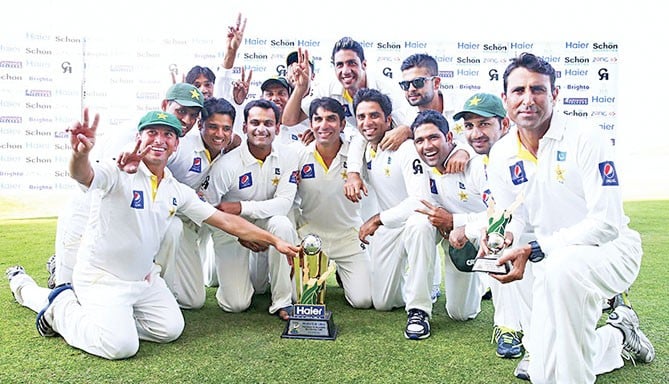
Pakistan cricket experienced success and failure though not in equal measure during what was quite a happening year

When it comes to Pakistan cricket it would be hard to find any year in the past couple of decades that lacked big news. 2014, too, wasn’t an exception either.
It was a happening year.
There were plenty of lows like Pakistan’s early exit from the World Twenty20 Championship in Bangladesh. But there were also highs like the country’s first series triumph against Australia in 20 years.
Pakistan’s Test year began with a drawn series against Sri Lanka in the UAE. After a long, barren period, there were more Tests for Pakistan involving Sri Lanka this time in their own backyard. It turned out to be a forgettable trip for the Pakistanis who suffered a 2-0 whitewash in the Tests in Galle and Colombo in August.
It was in the fall of 2014 that Pakistan compensated for their early losses by producing what was their most convincing performance in the longest format of the game in recent years. The venue was the UAE and the opponents were Australia. Pakistan whipped the Aussies in both the Tests to record their first series win against them since 1994. That year, Pakistan won the three-Test series 1-0 at home. Since then, they had lost six and drawn one series against the Australians. In the backdrop of such a dismal record, Pakistan’s crushing wins in Dubai and Abu Dhabi were duly celebrated.
In Abu Dhabi, Pakistan destroyed the Aussies in the process of winning the second Test by 356 runs, their biggest-ever Test win in terms of runs. Their previous biggest was by 341 runs, against India in Karachi in 2006. During the series Pakistan’s batsmen scored nine hundreds, the most by any team in a two-match series. No other side has ever scored more than six tons in a two-Test series against a top-eight team.
Pakistan’s shining star during the series and in fact the entire Test year was veteran batsman Younis Khan. Criticised for his indifferent form, dropped from the ODI squad and almost facing a Test axe, Younis transformed himself into a run-machine. In 12 Tests in 2014, Younis amassed 1213 runs at 71.35 with six tons including a double hundred.
The other big success story for Pakistan in Tests was skipper Misbah-ul-Haq. Misbah’s piled up 882 runs at an average of 63 but it was his captaincy record that earned him global acclaim. Misbah surpassed legends Imran Khan and Javed Miandad as Pakistan’s most successful captain with 15 Test wins.
Then there was Sarfraz Ahmed, who could be voted as Pakistan’s cricketer of the year. The young stumper finally ended Pakistan’s wicket-keeping problem with a series of breathtaking knocks both in Tests and one-dayers. Sarfraz accumulated 882 runs at 67.54 from nine Tests and hit three hundreds.
Except for the series against Australia, Pakistan’s bowlers rarely made their presence felt during the year. Ace spinner Saeed Ajmal once again made the biggest headlines but for the wrong reason as he was suspended by the International Cricket Council (ICC) for an illegal bowling action. In Ajmal’s absence, spin twins Yasir Shah and Zulfiqar Babar were brought in and the duo grabbed the opportunity with both hands. Both finished the year with 27 wickets apiece. Junaid Khan with 18 wickets and Rahat Ali (17) and Ajmal (17) were the other most successful Pakistani bowlers in Tests.
Pakistan’s ODI year was even more forgettable. They played 16 games in 2014 and managed to win just six including two against minnows Bangladesh and Afghanistan. Pakistan did reach the Asia Cup final thanks to back-to-back match-winning innings by Shahid Afridi but lost to Sri Lanka in the finale. They suffered series defeats against Sri Lanka, Australia and New Zealand and the spate of losses were certainly a big cause of concern for the team officials ahead of next year’s World Cup.
Afridi emerged as one of Pakistan’s most valuable players as he was their highest wicket-taker with 16 scalps at 41.56 at an economy rate of 4.62. The seasoned all-rounder was also the third highest run-getter for the team having scored 354 at 27.33. Opener Ahmed Shehzad was the top run-getter in ODIs with 629 runs at 39.31 followed by Umar Akmal (362 at 32.90). In terms of average, Fawad Alam who played half of Pakistan’s 16 matches in 2014, was the most successful batsman with 345 runs at 69. He was followed by Sarfraz Ahmed with 254 runs at 36.28.
Pakistan were largely unimpressive in the T20 format as well. They played seven matches and lost four of them. Their biggest T20 defeat of the year came against the West Indies in a World Twenty20 game in Dhaka. The 84-run loss threw Pakistan out of the title race. It was the first since the inception of the tournament that Pakistan failed to reach the last four. Later, Mohammad Hafeez stepped down as Pakistan’s T20 captain and was replaced by Afridi.
Meanwhile, during the best part of the year, Pakistan cricket experienced its very own Game of Thrones in the form of a power tussle involving Zaka Ashraf and Najam Sethi. In the end, it was neither Ashraf nor Sethi who claimed the throne but Shaharyar Khan, who managed to get a second innings as chairman of the Pakistan Cricket Board (PCB).
A separate Game of Thrones over the national ODI team’s captaincy remained inconclusive at the end of the year with ample suspense on the question as to who will captain Pakistan at World Cup 2015 to be co-hosted by Australia and New Zealand. The Board continues to back Misbah but a hamstring injury has raised some doubts. Afridi, who captained Pakistan in World Cup 2011, remains a strong contender. Whoever leads the team, one hopes that Pakistan will have a better year in 2015, something that they can guarantee with a strong showing in the World Cup.